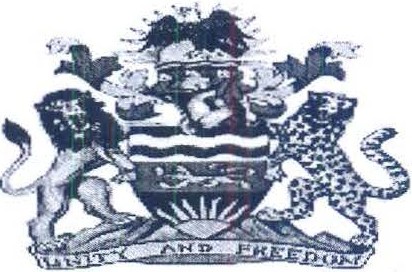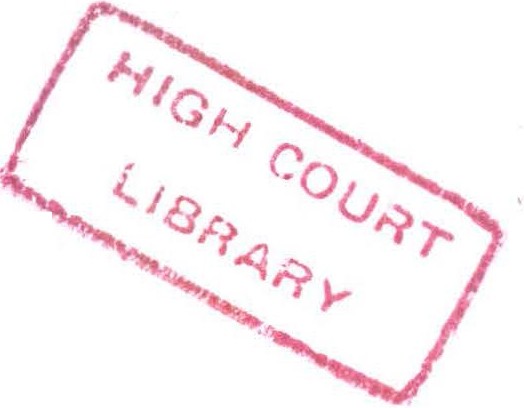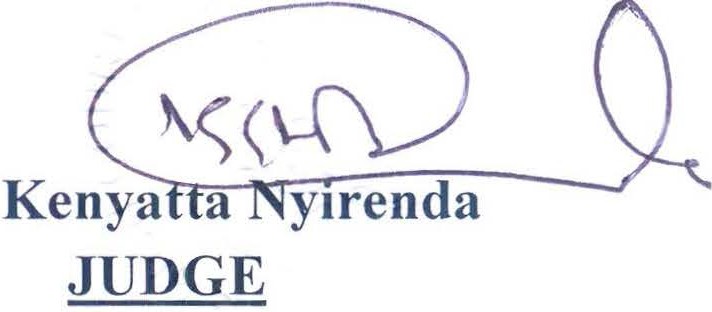Jane Bothomani & Others v Administrator General Kenyatta Nyirenda, J. Jane Bothomani & Others v Administrator General Kenyatta Nyirenda, J.


JUDICIARY

IN THE HIGH COURT OF MALAWI
PRINCIPAL REGISTRY
CIVIL CAUSE NO 2725 OF 2004
BETWEEN
JANE BOTHOMANI & OTHERS ....................................... PLAINTIFF
AND
ADMINISTRATOR GENERAL ………………………………. DEFENDANT
NBS BANK LIMITED ................................................. THIRD PARTY
CORAM: THE HONOURABLE JUSTICE KENYATTA NYIRENDA
Mr. Maliwa, of Counsel, for the Plaintiff
Defendant, absent
Mr. Mpaka, of Counsel, for the Third Party
Mr. O. Chitatu, Court Clerk

![]()
 Kenyatta Nyirenda, J.
Kenyatta Nyirenda, J.
ORDER

The facts leading up to the Plaintiffs' Summons can be briefly stated. On 17th September 2004, the Plaintiffs commenced an action against the Defendant by Originating Summons for (a) an order that an account be taken of the sum of K141,029.90 received by the Defendant on 19th July 1990 and 30th January 1991 as administrator of the estate of the late Isaac Binusi Bothomani for the benefit of the Plaintiffs claiming the sum of K141,029.90 plus accrued interest, (b) an order
for payment of the said sum of K141,029.90 plus interest accrued thereon to the Plaintiffs and (c) an order for costs of the action.
On 14th February 2007, the Court rendered its judgement in favour of the Plaintiffs and ordered that costs and interest be taxed and assessed by the Registrar. On 21st July 2009, the Registrar assessed the interests payable by the Defendant and the Third Party as K818, 158.97 and K 1,864,641.38 respectively [Hereinafter referred to as the "Order of Assessment"].
On 25th August 2010, the Third Party filed a Notice of Appeal against the Order of Assessment and hearing was set for 3rd November 2010. On the set hearing date, the appeal was not heard on account of Counsel for the Defendant who stated that he needed time to study the matter because he had just been appointed. No further step has been taken in respect of the appeal. On 22 February 2011, the Third Party was granted the Stay Order.
The Plaintiffs seek to have the Notice of Appeal and Stay Order dismissed on four grounds:
(a) want of prosecution;
(b) irregularity in that the terms of the Stay Order do not reflect the ruling of the late Justice Manyungwa;
(c) want of jurisdiction on the part of the Judge that heard and granted the Stay Order; and
(d) abuse of court process. Submissions by the Plaintiffs Irregularity
Counsel Maliwa submitted that where leave of the court is needed to file an appeal, any appeal filed without such leave has no legal effect. He placed reliance on the dicta by Chief Justice Unyolo (as he was then) in The State and the President and others Ex-parte Honourable Dr. Cassim Chilumpha, MSCA Civil Appeal Number 10 of 2006:
"The other point taken by Counsel for the Respondent relates to an appeal the State has lodged before the Supreme Court of Appeal against Chipeta, J's order herein. The short point taken by Counsel for the Respondent on this aspect is that the said appeal has been filed without the leave of the Court, either of the Court below or of this Court, as required under section 21 of the Supreme Court
of Appeal Act. This point is brought out because it is connected to the order of stay.
On the available facts the Respondent's point is made out, leave of either the lower Court or of this Court was not sought and has not been sought, to this day. In terms of section 21 above, no appeal can lie to the Supreme Court of Appeal without leave, and the purported appeal by the Honourable Attorney General herein is therefore without legal effect. "
Counsel Maliwa then drew the Court's attention to rule 3 of the High Court (Exercise of jurisdiction of Registrar) Rules which provides as follows:
"Any person affected by any decision of the Registrar may appeal therefrom to a Judge at chambers. Such appeal shall be by notice in writing to attend before the Judge without a fresh summon, within 7 days after the decision, Order or direction complained of, or such further time as may be allowed by a Judge or Registrar. Unless otherwise ordered, there shall be at least one clear day between service of the notice of appeal and the day of hearing. An appeal, from the decision, Order or direction of the Registrar shall be no stay of proceedings unless so ordered by a Judge or the Registrar"
In applying the law to the present case, Counsel Maliwa submitted that as the decision being appealed against was made on 2 l5t July, 2009, an appeal was supposed to be filed without leave by the 30th of July, 2009. However, the Notice of Appeal was filed on 21st January, 2010, more than six months after the making of the decision being appealed against.
Counsel Maliwa argued that in view of the fact that an appeal was not supposed to be filed in the absence of prior leave, effectively, there is no appeal at law. In his view, the end result is that the Stay Order, being valid until the outcome of the appeal, automatically falls out as it was based on an appeal that does not exist at law.
Want of prosecution
Counsel Maliwa submitted that there has been inordinate and inexcusable delay on the part of the Third Party in prosecuting the appeal. The submission was put in the following terms:
"3.22 It is evident from the above that it is now over six years since the matter was last set down for hearing.
3.23 The law expects any party to a case to prosecute its action to the very end. It was therefore incumbent upon the Third Party herein to prosecute its appeal to the very end.
3.24 From the last day the hearing of the appeal herein was set down, over six years ago, the Third Party has not obtained a date of hearing. It cannot be expected that a party can seriously engage the court for a period of over six years without being given a date of hearing, more so when a party is represented just like in the present case. "
Counsel Maliwa contended that the delay in the matter is clearly inordinate and the only sensible thing for the Court to do is to have the appeal dismissed for want of prosecution. He cited the cases of Allen v. Mc Alpine [1968] 1 ALL ER 543 and Reserve Bank of Malawi v. Attorney General, Constitutional Cause Number 5 of 2010 (unreported) to buttress his contention. In the latter case, Sikwese J. stated as follows:
"...Power to dismiss action should be exercised only where the Court is satisfied either:
1. that the default has been international and contumelious e.g. disobedience to a peremptory order of the court or conduct amounting to an abuse of the process of the court: or
-
2.
(a)
That there has inordinate and inexcusable
delay on the part of the Plaintiff or his lawyers; and
(b)
that such delay will give rise to a substantial risk that it is not possible to have a fair trial of the issues in the action or is such as likely to cause or do have caused serious prejudice to the defendants either as between themselves and the Plaintiff or between them and a third party. "
Counsel Maliwa also submitted that the Plaintiffs' rights to an effective legal remedy and justice have been compromised for all these years. It was thus argued that it would be unfair to prolong this period further.
Irregular Stay Order
Counsel Maliwa submitted that it is settled law that an application for stay must first be made in the court that granted the order before it is lodged in the higher court. He further stated that the higher court will only entertain an application for stay of execution if and only if the applicant has shown that the court below refused the same.
Counsel Maliwa referred the Court to Practice Note 59/13/9 in the Rules of the Supreme Court which states as follows:
"The application must be made in the first instance to the lower court below (see r14(4); but if it refused, the application to the court of the appeal is not an appeal; thejurisdiction is concurrent. The application should, ifpossible, be made to the court below at the time it gives judgment, but, if not, it can be made subsequently on notice. If it is refused, application can be made to the court of appeal within reasonable time. "
Counsel Maliwa also cited the cases of The Anti- Corruption Bureau v. Amos Chinkhadze & Joe Kantema, MSCA Criminal Appeal No. 1 of 2003 and Frankline Chirwa & Jones Chirwa t/a Global Tradelines v. Manica Malawi, MSCA Civil Appeal No. 58 of 2008 in support of his proposition that an application must be made in the first instance in the court below which made the order.
In applying the law to the present case, Counsel Maliwa submitted that:
"3.36 In the matter at hand the decision being complained against was made by the Registrar, it follows therefore from the above exposition, that any application for stay of execution was supposed to first be made to the Registrar and where the same was denied to a Judge.
3.3 7 Contrary to the provision of law, the Third party directly proceeded to the Judge without approaching the Registrar first. This being the case, the Judge that heard and granted the order lacked jurisdiction so to do as his jurisdiction was subject to the Registrar's refusal to grant the application. "
Counsel Maliwa concluded on this point by stating that as the court that granted the stay order lacked jurisdiction, the stay order is null and void, that is, there is effectively no stay order at law.
Abuse of Court Process.
Counsel Maliwa submitted that the law proscribes against abusing the machinery of the court process:
"3.47 The court delivered its judgment years back but the Third Party's irregular stay order and Notice of Appeal have prevented the Plaintiffs from enjoying fruits of their litigation for over six years.
3.48 By using the court to administer injustice, the Third Party is in the abuse of court process. "
Submissions by the Third Party
The Third Party filed no affidavit but Counsel Mpaka sought and was granted leave to address the Court on legal points only.
Counsel Mpaka had two main legal points. Firstly, Counsel Mpaka invited the Court to note that after the Third Party had realized that the appeal was not being prosecuted with dispatch, it changed legal practitioners on 17th January 2017 from Messrs David Bandawe & Associates to Messrs Destone and Co. In light of this appointment, Counsel Mpaka argued that the Third Party should be given a chance to prosecute the appeal so that the appeal is resolved on merit.
Turning to the submissions by the Plaintiffs regarding (a) irregularity of the Stay Order, (b) want of jurisdiction on the part of the Judge that heard and granted the Stay Order and (c) abuse of court process, Counsel Mpaka contended that these are matters to be dealt with at the hearing of the appeal and not at this stage.
Counsel Mpaka concluded by praying that the application be disallowed and, given the history of the matter, costs be in the cause.
Analysis and Determination
I have carefully perused all documents on the Court file, including the affidavits and written submissions filed by the Plaintiffs, and listened to both counsel's oral submissions.
With respect to want of prosecution of an appeal, the principle on which courts go is clear. When the delay is inordinate or prolonged and inexcusable and is such as to do grave injustice to one side or the other, or to both the court may, in its discretion dismiss the appeal straight away leaving the Appellant to his remedy against his own legal practitioner who has brought on him or her the plight.
In the present case, the Notice of Appeal was filed on 28th December, 2009 and the last time the appeal was set down for hearing was 28th March, 2011. The Third Party has paid a blind eye to the matter. More than six years have now elapsed without the Third Party taking any step to prosecute the appeal herein. In my view, considering all circumstances of the present matter, the delay is intolerable. "They have lasted so long as to turn justice sour", to use the words of Lord Denning M.R. in Allen v. Sir Alfred McAlpine & Sons Ltd, supra. The onus is on the Third Party to prove that the Plaintiffs have not suffered prejudice as a result of the prolonged delay. The
Third Party, having filed no affidavit, has failed to discharge the burden in that respect.
To my mind, it is certain and undeniable that the approach of the Third Party constitutes contumacious conduct and abuse of court process of the highest order. In the premises, the Court has no hesitation in granting the two orders sought by the Plaintiffs, namely, an order dismissing the Third Party's Notice of Appeal and an order setting aside Order for stay.
As regards costs, these normally follow the event, and since the Plaintiffs have succeeded in their summons, I order that the costs of these proceedings be borne by the Third Party. I so order.

1 1